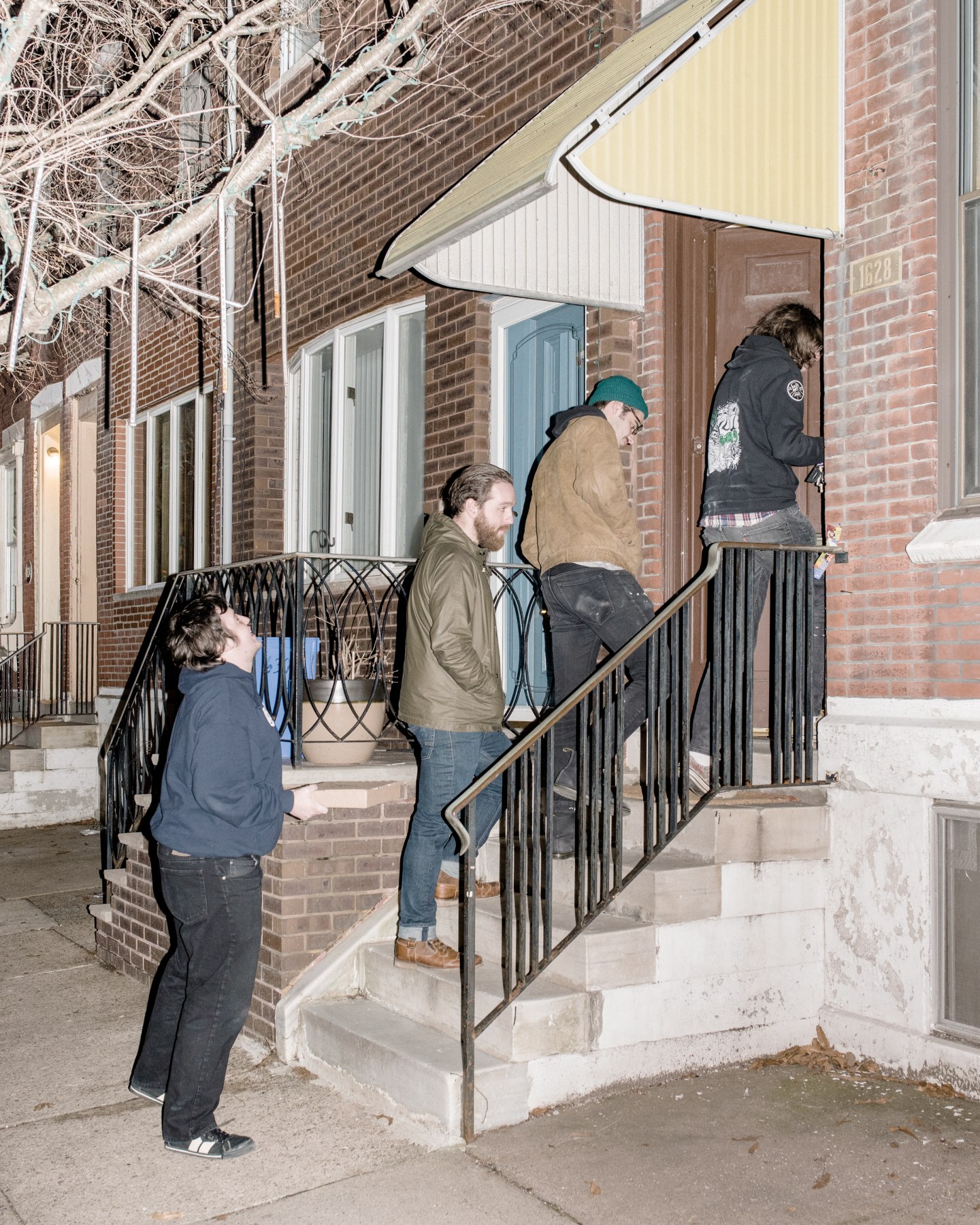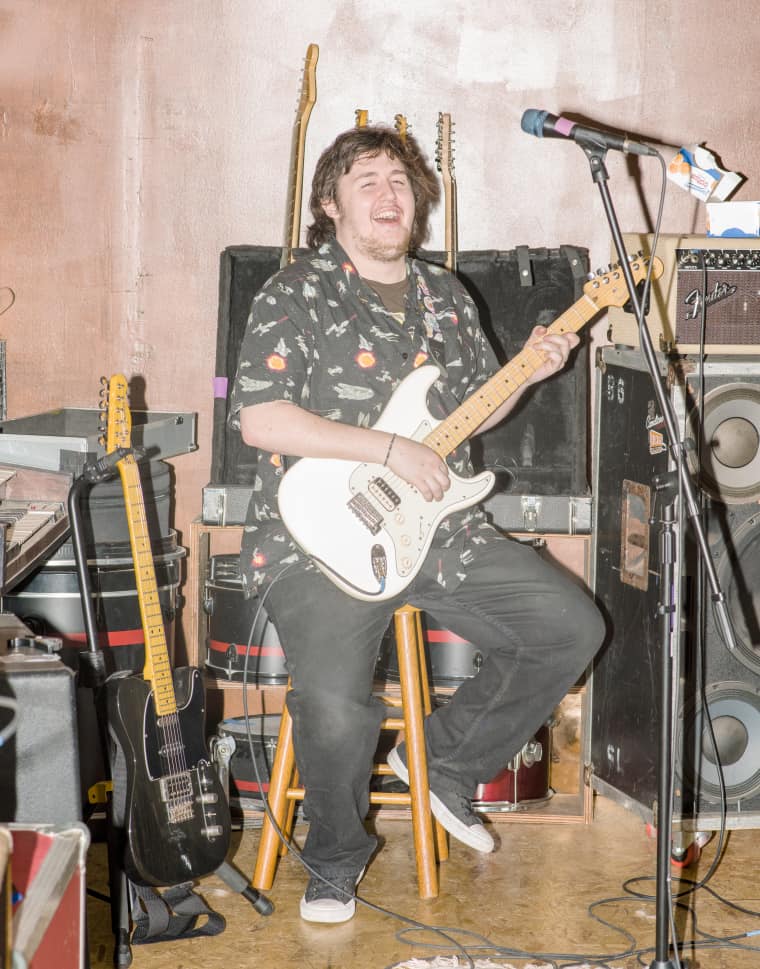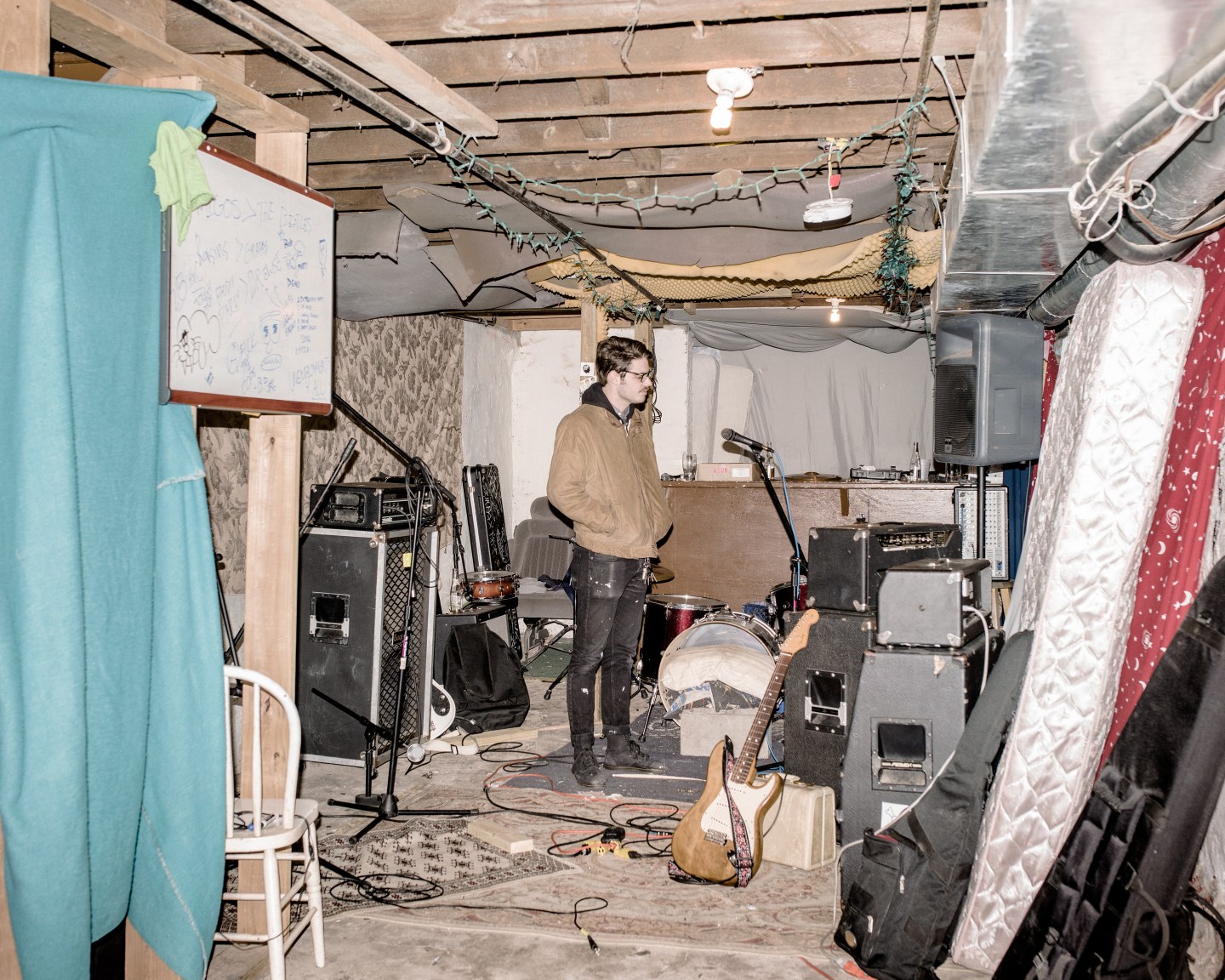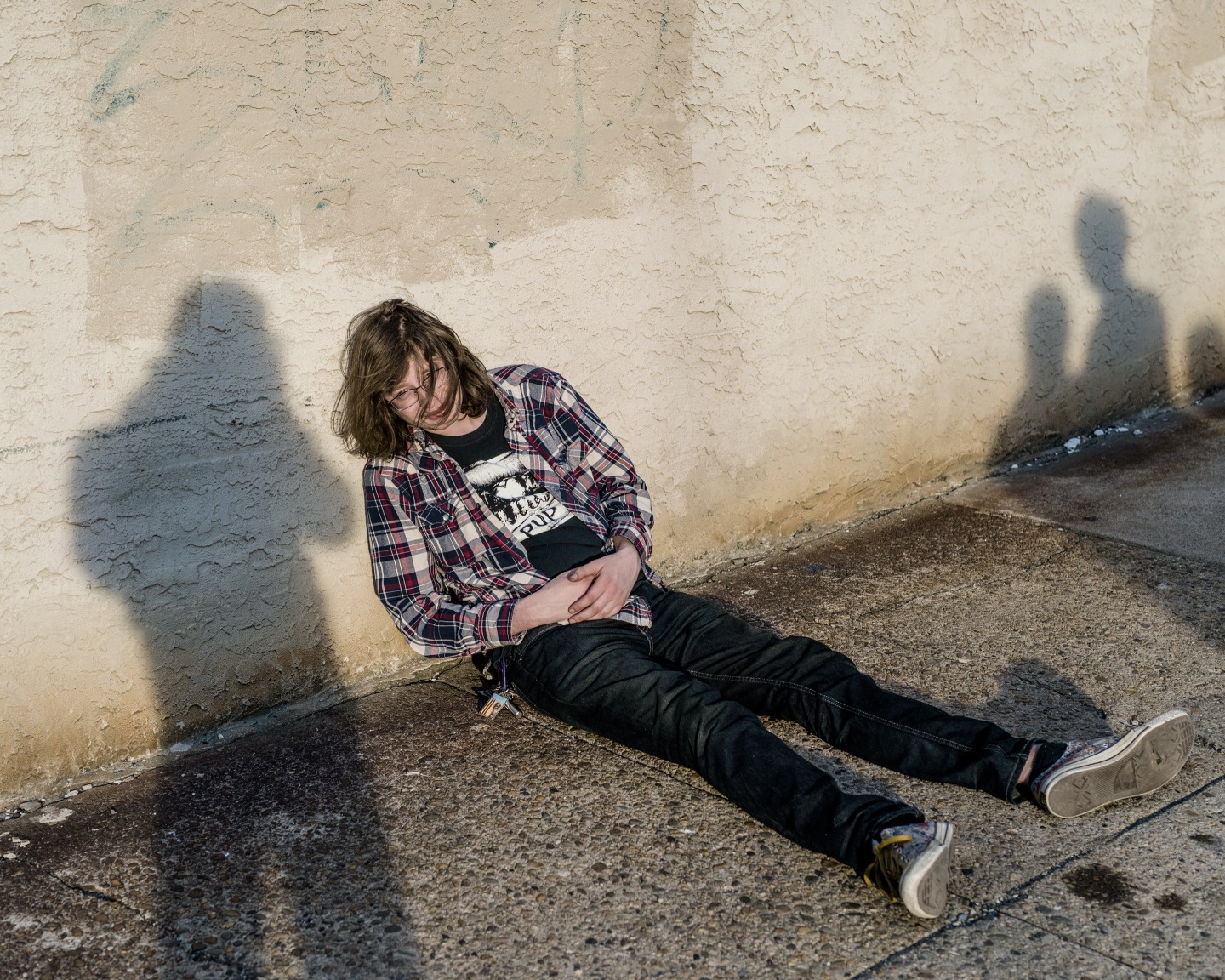
Somewhere in West Philadelphia, not too far from Drexel’s tangled network of dorms and classrooms, there’s a house called Michael Jordan, or MJ for short. It’s made out of dirty bricks, and there are five fading photographs of its celebrity namesake taped inside the window above the door. No one who plays in Modern Baseball lives here anymore, but for a while it was something like the Philadelphia rock band’s unofficial headquarters. They slept here, mailed out merch here, and stored gear here. They threw parties, kissed girls, and planned tours. Inside this shabby three-story house, everything started coming together. But in the dog days of summer 2015, it was also where Modern Baseball almost completely fell apart.
“MJ was where Philly kind of took us in,” says Brendan Lukens, a 23-year-old with chin scruff and chipmunk cheeks. He’s one of the four-piece’s two frontmen, and when we meet in early March at his current apartment in Brewerytown, an unflashy neighborhood in North Philly, he’s shuffling around the house in straight black jeans and a navy pullover. “MJ was where we really figured out how to ‘do’ Modern Baseball,” he tells me.
Brendan’s new apartment isn't a punk house, but it’s not a grown-up space either. A vicious, unreleased rock song by the Canadian band PUP is playing from the stereo, and a small tabby cat is tip-toeing across a crate of records. His roommate Cam Boucher, who plays in the bands Sorority Noise and Old Gray, is here too. Brendan is trying to make a cup of coffee, but first he has to clean a mug. Cam offers me some Gushers while we wait.
 Brendan Lukens
Brendan Lukens

The coffee’s for me, since Brendan doesn’t actually drink the stuff anymore. Everybody knows too much can make you feel jittery—or worse, anxious—and he’s notably susceptible to this phenomenon. On “Rock Bottom,” a half-acoustic song from You’re Gonna Miss It All, his band’s Billboard-charting 2014 full-length, he banters about it in a nasally, conversational tone: Can we highlight the fact that my mouth smells like coffee and garlic? The five cups I had this morning are getting to me.
Like the bulk of songs that get tagged as emo, “Rock Bottom” details a romantic encounter. Heartbreak is one of the nebulous genre’s most defining traits, as well as ammo for its harshest skeptics. “Rock Bottom,” which wouldn’t have been out of place on a label sampler from Vagrant Records’ turn-of-the-century heydey, doesn’t try to re-wire the formula: it’s hinged on nervous observations, a catchy hook, and the kind of will-they-won’t-they tension that makes watching teen TV dramas so addictive. This one ends happy, for the most part: the narrator, probably Brendan, decides to spend the night with a girl even though he feels like shit and has school the next day. His rationale comes via the song’s most quotable aside, engineered to be shouted in unison by a mob of dewey-eyed young adults: It’s OK, because whatever forever!
Less than 24 hours after my visit to Brewerytown, Modern Baseball will release the first singles from Holy Ghost, their second full-length for cult Boston rock label Run For Cover, and third overall. Since Brendan wrote the lyrics to the LP’s back half, and his bandmate and best friend Jake Ewald wrote the front, they decided to put out one song from each side. The band and their team have been calling tomorrow “Fuck Day,” which seems to accurately describe the sort of edgy excitement that Brendan is presently fraught with. “Modern Baseball is my first band ever,” he says. “So my heart will always really be in it. I’m always stressed.”

“Even though that house was great, it fueled, like, every bad thing that would come back to haunt me.” —Brendan Lukens
Brendan has a hopelessly contagious laugh. It’s high-pitched and staccatoed and can literally lift the mood of a room. It might be at least partially why he was well-liked at his high school in Brunswick, Maryland, where he played soccer religiously and, toward the end, hung around with Jake, a handsome guitarist with strict parents who was one grade below. Their goofy best-friendship origin story is one they love telling: in 2010, Brendan had a big crush on Jake’s twin sister Hannah, so he went to see the siblings’ band play in someone’s backyard. “They sounded exactly like Paramore,” Brendan remembers. Somehow he managed to step in a big pile of dog crap, and Jake happened to have some extra sneakers. They’ve been buddies ever since. “It clicked pretty much immediately that we were going to be friends no matter how the thing with Hannah turned out,” Brendan says. “He's the best—he's also the worst cause he's so great at everything. But he's the best.”
It was Hannah that encouraged the pair to start writing songs together, and the strummy confessionals they came up hardly fit in with suburban Maryland’s hardcore-centric rock scene. Though not technically part of the Modern Baseball catalog, the first song Brendan ever wrote was titled “How Do I Tell A Girl I Want To Kiss Her” and sampled dialogue from When Harry Met Sally and Eternal Sunshine.
Looking back, the most enduring emo music was historically made and consumed by people like Brendan and Jake: kids with big hearts from little towns who are smart but not nerdy and popular but not mean. “They haven’t really thought the deep thoughts yet,” journalist Andy Greenwald wrote of “the emo kids” in his non-fiction time capsule, Nothing Feels Good: Punk Rock, Teenagers, and Emo, first published in 2003. “They’re too caught up in the majesty of their own private drama and they’ve found a music that privileges that very same drama—that forces no difficult questions, just bemoans the lack of answers,” he writes. But what happens when your private dramas are darker than an unrequited crush—when you no longer just desire answers, but you actually need them?
 Jake Ewald
Jake Ewald
Modern Baseball as it exists now was born in Philadelphia, though, the not-so-secret epicenter of American DIY rock. If you think about it, it’s the perfect city for a fledgling band to figure things out: practice spaces are roomy and dirt cheap—essentially free when compared to Brooklyn’s stratospheric rents. There’s a pre-established, generally inclusive scene that includes great bands like Hop Along, Alex G, Swearin’, and Cayetana. Plus it’s a quick drive to a bunch of major Northeast cities. Brendan enrolled at a small liberal arts school called Chestnut Hill after graduation, and Jake joined him in Philly a year later, when he started classes at Drexel.
The band’s two other members, drummer Sean Huber and bassist Ian Farmer, are Drexel kids too. Sean—now 25 with a full beard, a fiancée, and tattoo sleeves—was a couple years older. “Sean scared the shit out of me cause he was this intimidating-looking guy who only listened to punk music,” Brendan says. “He’s like the grown-up—he was buying us beer when the band first started, and on long drives he puts earplugs in and won't listen to any of us.”
Ian, a lovable goof with long hair and square glasses, studies music engineering with Jake at school (they’re currently in their last semester of classes; on one occasion during the reporting of this story, Ian retreats to do homework). He helped produce Sports, Modern Baseball’s scrappy debut full-length, which came out near the end of 2012 on Lame-O, the small Philly label run by their friends Eric Osman and Emily Hakes (Osman acts as Modern Baseball’s manager too). “Ian was putting in the 9 p.m.-to-8 a.m. sessions on Sports,” Brendan remembers. “We were like, 'OK, maybe we should ask this guy to play bass! He's already with us all the time anyway.'”
 Ian Farmer
Ian Farmer
The most popular song on Sports is probably “The Weekend,” a celebratory track built on a string of dramatic drum fills, climactic sing-a-long sections, and Brendan’s sentimental lyrics: You’ve got a smile that can light this town, and we might need it/ Cause it gets dark around here/ Real dark around here. The hook’s gang vocals and plural pronouns are pointed—it’s designed to be sung with friends, red plastic cups hoisted high. The music video, which has over a million YouTube views, is pure nostalgia porn: it’s a smart, euphoric recreation of every fun house show ever—full of singing, smiling college kids wasted on malt liquor and youth.
A lot of the video was filmed in the Michael Jordan house’s dilapidated basement, which by that time had become a functioning show space and Modern Baseball’s primary home base. The video’s storybook debauchery is probably not too removed from the reality of their existence there, for better or for worse. In a few scenes, Brendan stares dead-eyed at the camera, his tie-dye-covered torso gliding through space in slow-motion while the party rages around him. As it turns out, “The Weekend” is a live-in-the-moment anthem written by someone who often found the moment really hard to live in. “Even though that house was great, you never wanted to leave it, ” Brendan says. “That was the bad part about it. It was great—but it fueled, like, every bad thing that would come back to haunt me.”

“Ian and I would get out of class and just talk about the latest thing that was weird with Brendan, and try to figure out what we could possibly do to make it better.” —Jake Ewald
Jake Ewald comes from a long line of straight-laced, no-bullshit humans: his paternal grandfather was a minister, his mom’s a minister, and his dad is a superintendent (Picking at holes in my jeans/ There's so much God in my gene pool, he sings on You're Gonna Miss It All highlight, “Two Good Things.”) With that sort of upbringing, it’s not a huge surprise that he seems thoughtful and pragmatic, both in person, with his neatly cuffed skinny jeans and well-groomed facial hair, and on record. Like Brendan, Jake writes songs that are witty and riddled with existential angst. But there’s a deliberateness to his world-weary poetry, too—a neurotic quality that distinguishes it from Brendan’s more unhinged style. “He's definitely in his head,” Brendan told me. "He wants things his way, but in a much nicer fashion than I do.” When Jake and I meet for lunch on “Fuck Day” at Liberty Choice, a wide-open grocery store in Fishtown that serves delicious falafel sandwiches, he seems preternaturally at ease, like it’s just another Thursday.
For Jake, moving into the Michael Jordan house was a big leap on a personal level. “I felt like my parents were constantly over my shoulder,” he tells me after we pick seats in the big, unnervingly empty second-floor eatery that overlooks the whole market. “To be away from my parents, with my own room, where I could like sing and write songs whenever I wanted was kind of crazy,” he remembers. A lot of life-altering things would happen there: Jake was at MJ the night he found out his grandfather was going to die. “He just stepped outside, to like, say goodbye,” Brendan told me. “He came back in straight-faced and I, his best friend, never heard about it—ever.”
Jake’s half of Holy Ghost finds him grappling with that loss in a way that he couldn’t with his friends. Said goodbye from the front porch/ I always wonder if you’re smiling at us or looking away, he sings on “Wedding Singer,” a track that, funny enough, contains the record’s brightest guitar melody. There’s definitely songs about love on there, like the indelible highlight “Mass,” but his half also touches on stalled-out grief, lapsed faith, and the nerve-wracking privilege of being in a popular band and singing words that people actually care enough to listen to. Words just whining, every fucking day/ What do I really want to say? he screams near the end of “Note To Self.”

But if the freedom of Michael Jordan initially brought Jake clarity, it brought Brendan something much worse. In the house’s most debauched era, it was Brendan who was pulling the strings. “He knew how to command a party,” Jake remembers. “He would be like, 'We're gonna invite these people over, we're gonna play beer pong, and I made this sick playlist with all these killer songs on it and built this gravity bong out of a 10-gallon water jug.’ It was fun for a while, but after a couple of years, it grew into him doing more of that stuff on his own.” Jake struggles to pinpoint exactly when things took a turn, but he says Brendan, who has struggled with depression and anxiety his whole life, started having scary mood swings and rage-filled outbursts, escalated by binge drinking and an increasingly bleaker state of self-worth. “I have a couple vivid memories of him being really drunk and me getting kind of freaked out by him—like a person that I didn't know.”
After Modern Baseball released You’re Gonna Miss It All in February 2014, the 29-minute record reached #97 on the Billboard 200 and earned them lots of new fans, both inside pop-punk and DIY rock circles and outside of them. It also led to big-time tour offers, though life on the road wasn’t great for Brendan’s mental health. “We would just be drinking in the hotel room for hours, cause we didn't have anything else to do after the show in, like, Minnesota,” Jake says. “Around 1:30, 2:00 in the morning, somebody would say, like, one thing that was in no way offensive to anyone, but he would process it to be against him. And he would start yelling.” At home between tours, things were even more dire. Increasingly hermitic, Brendan would stay inside Michael Jordan for days—guzzling Jack Daniels, getting high, and cutting up his arms. “By the end of the week, I realized I spent like $700 on just drinking and smoking and razors,” Brendan said.


Brendan started self-medicating with narcotics too: percocet, lithium, whatever he could consume without kicking up too much dust. “Before I go on the train, I think of the worst situation that could happen to me on the train and how to get out of that,” Brendan told me. “That is me. So, I was like, ‘How am I going to get caught? Oh, this is the way around it.’” Brendan’s bandmates didn’t fathom the extent of his secrets, which included stealing money from Modern Baseball to fund his spiraling addictions. But they know him better than anyone, and he couldn’t hide the fact that something was amiss. “We all talked about it actively,” Jake says. “Ian and I would get out of class and just talk about the latest thing that was weird with Brendan and try to figure out what we could possibly do to make it better.”
Jake says he remembers Brendan cutting himself back in high school, but it didn’t last, or so he thought. “The first time that we got really worried about him hurting himself was while we were recording the EP,” Jake remembers. He’s talking about the breathlessly titled MoBo Presents: The Perfect Cast EP Featuring Modern Baseball, a six-song release written and recorded in 2015, a few months before the band hit the road for a long summer tour with mid-’00s emo giants Say Anything, one of Modern Baseball’s biggest influences. “He would show up to sessions with cuts all up his arms, like wrist to elbow.” On the EPs opening song, “The Waterboy Returns,” Brendan repurposed a string of concerned text messages into lyrics: Hey you, that's no way out/ You can't find help in a bottle or a cut/ They'll choose the wrong way to remember you. The EP was released as a surprise in October 2015; if it had come out a couple months earlier, it would have been Brendan’s most visible cry for help.

It was warm out the night Brendan Lukens almost killed himself. It might have been cooler three stories up on the roof of Michael Jordan, but August in the northeast is brutal, and the humidity tends to linger in the air long after sundown. It was August 17, a couple days after his 23rd birthday. He was standing up there, the lowest he’s ever been, imagining what it would be like to not exist at all. It took a cosmically timed text from Jake—“something really dumb, like a Clickhole article”—to snap him back into reality. He climbed down, and the next day he confessed to Cam Boucher what had happened. Cam called Jake, and Jake, after talking it over with Jessica Flynn, his girlfriend and the photographer behind the Holy Ghost cover art, decided to call Brendan’s mom.
“That was like the hardest conversation I’ve had with anyone,” Jake tells me. “There was so much heartbreaking stuff that neither of us knew the other side of.” Brendan’s parents drove up the same night and knocked on the door of Michael Jordan in the wee morning hours of August 19th. “She was like, ‘You're coming home. Like, we're taking you into treatment,’" Brendan remembers. Brendan didn’t want to go—“I threw a fucking fit”—not least because it would mean calling off a string of Australian tour dates, plus coveted appearances at both Reading and Leeds. But he came around, and agreed to check himself into a Maryland facility, where he was diagnosed with bipolar disorder, behavior disorders, manic depression, alcoholism, high marijuana consumption, cutting behavior, suicidal thoughts, and suicidal tendencies. “When they said it I felt like it was a courtroom,” he says.
It’s been seven months since that night, and Brendan hasn’t had a drink or touched a razor since. He smokes a joint in front of me at his apartment in Brewerytown because, he says, it helps ease the stomach-flipping side effects caused by all his new medications. “They haven't figured out my cocktail yet,” he says, laughing. We talk about the time they spent recording Holy Ghost, a process that began mere days after his five-week stint in the treatment program. When they hit the studio, Jake’s half of the songs were well past the demo stage. Brendan, however, had nothing. “I remember sitting down in my bed and being like, ‘We have to record an album in two days, I don't know if this even is gonna go down.’" But when the time came, the words poured straight out of him. “They were all just kind of like, ‘Fuck,’” he remembers of his bandmates' collective reaction. The resulting lyrics, which drift between spiritually tormented and flat-out inspiring, are entirely about treatment, Brendan says.
Holy Ghost marked the first time Sean and Ian wrote all their own drum and bass parts, and it was the first time Modern Baseball ever recorded an entire full-length together, as a unit. Nowhere is that togetherness more audible than on “Just Another Face,” the record’s legitimately epic closer. The verses are despairing: I’m a waste of time and space, drifting through my selfish ways/ I don’t know how I got here, Brendan sings over bleeding chords and mid-tempo percussion. But the chorus is reassuring, especially set against a clamoring swell of guitar warmth: If it’s all the same it’s time to confront this face to face/ I’ll be with you the whole way. Brendan’s lead vocal is almost swallowed up by the band, probably because at this point they’re not shouting with him, but actually at him: Even if you can’t see it now/ we’re proud of what’s to come, and you.
It’s a weirdly fitting end to a great record, and it hits extra hard once you know about the real-life catharsis that inspired it. “I remember Jake saying, 'This is the realest thing you've ever written,'” Brendan tells me. It’s the kind of urgent, deeply personal rock song that reminds me why bands like Modern Baseball will never cease to have an audience: there’s always gonna be kids looking for something that feels real. There’s always going to be lost souls looking for a reminder that they’re not in this alone.

During the holidays, Philadelphia’s 13th Street becomes a Christmas Vacation-level spectacle. It’s one of the city’s best-known seasonal light displays, and when Brendan and I arrive at Ian’s new house nearby, there are still fake icicles on the trees lining the street—even though it’s March. The house, which he shares with their manager and a few other roommates, is big but homey; the ceilings are tall, the walls are made of wood, and every room feels like the “family room” at your grandparents’ old house. In the foyer, Sean, Ian, and Jake all greet Brendan separately. I think it still makes them happy to see him up and about, especially in good spirits.
When the whole band’s in the same place, everyone sinks into their roles. Ian’s the mischievous one. His limbs are long and noodly, and he looks almost insect-like as he darts around the house’s first floor. He forces Jake to smell a dangerously hot ghost pepper, starts playing a ukulele, and makes everyone try the artisanal pistachio gelato he found in the freezer—all within a few minutes of our arrival. “He’s the guy who will give you a huge hug for too long, like, preventing you from going on to do something else,” Jake tells me. “But he’s also the person who will text you and be like, 'Hey man, are you OK?'”
